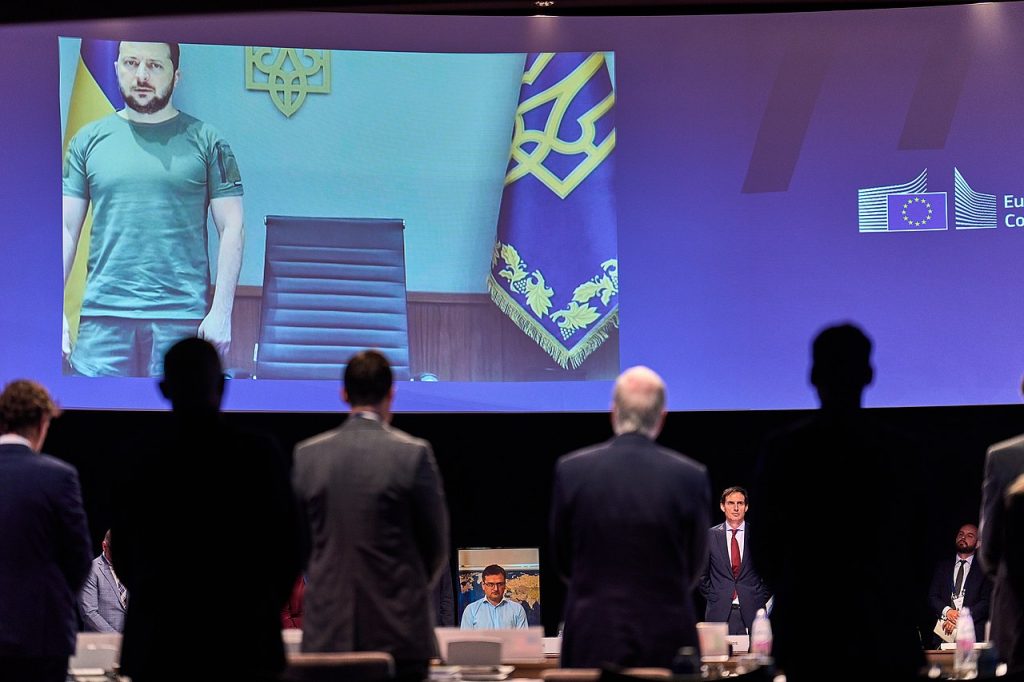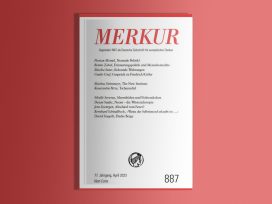Accounting for war crimes
The war crimes charges brought by the ICC against Putin are a breakthrough. But built-in safeguards of national interest, combined with an incomplete patchwork of mechanisms and jurisdictions, mean a long way ahead before Russia is prosecuted under international law for the crime of aggression.
The Russo-Ukrainian war has reignited old debates on the right to wage war (ius ad bellum) as well as on the rules to abide by in armed conflict (ius in bello) and their ramifications in international criminal law. However, the chasm between debates on the laws of war and the lived experience of it have once again been revealed. The two must be reconnected by restoring war’s historical connections with political violence.
There is much at stake here. Any meaningful thinking about the legal rules of war must include a moral code for living in the midst of conflict. In other words, we must be able to speak about the struggles and commitments of the real-life people whose lives war has shattered.
Under the law of armed conflict, no entity is accountable for lawful acts in war that cause harm. For unlawful acts such as war crimes, on the other hand, accountability mechanisms rarely create a right to compensation for victims. Even if they did, the power of the proposed International Claims Commission for Ukraine to resolve mass claims associated with war crimes committed by Russia will likely have limited jurisdiction and an even more limited effect. Creating an international war torts regime may establish a more effective route for the compensation of civilians harmed in armed conflict, and thus at least partially address the accountability gap for wartime victims in international law.
With the overarching aim of victim compensation, we must reconsider the respective benefits of international tribunals, claims commissions, victims’ funds, domestic courts and various hybrid systems. Pathways need to be established for claimants and defendants to be informed about the elements of a war torts claim, including the address of necessary level and type of harm, liability and causation standards, possible substantive and procedural affirmative defenses, and potential remedies. Because the law of state responsibility remains the weakest part of international criminal law, there needs to be a new blueprint for a comprehensive accountability legal regime for civilian harm in armed conflict, above and beyond the current architecture of international law.

Volodymyr Zelensky speaks at the Ukraine Accountability Conference at The Hague in July 2022. Image: Dutch Ministry of Foreign Affairs. Source: Wikimedia Commons
Russia’s violation of the UN Charter
In his speeches of February 2022, the Russian head of state Vladimir Putin justified the invasion of Ukraine under the terms of Article 51 of the United Nations Charter as self-defence, henceforth calling it a ‘special military operation’. Putin’s reasons were the following: Ukraine is committing genocide against Russian speakers in the east of the country; historically, Ukraine has been a part of Russia, and it is not a legitimate state; Ukraine’s accession to NATO would pose a direct threat to Russia’s security of Russia; Ukraine’s ability to develop nuclear weapons endangers Russia; Ukraine plans to suppress separatists and retake their territories by force.
These allegations, which are not factual statements, can be categorized into three categories in international law: suggested violations of Russian territorial integrity; suggested threats to Russia’s territorial integrity and political independence; and suggested humanitarian intervention. Whether these allegations justify the use of force according to international law is beyond the scope of this article. Suffice to say that Putin’s reference to Article 1 of the UN Charter was a reaffirmation of Russia’s commitment to the Charter’s norms and legal validity.
The Charter established a legal order in the aftermath of WWII to maintain peaceful relationships among nation states. To this end, it laid down a set of non-negotiable purposes and principles (outlined in the Preamble and Articles 1 and 2). The system of the United Nations also specifies the appropriate means for evaluating each of Russia’s allegations. In principle, Russia must have adhered to the procedures set forth in the Charter law, instead of immediately resorting to force. At the very outset, Russia’s use of force violated its obligations under the Charter law.
It is important to note that peacemaking processes are not governed by international legal frameworks. The core idea of the current system is essentially pre-emptive: to stop states engaging in war in the first place. Similarly, there is very little built into the current system in terms of ius post bellum. This is largely left to the states involved in a conflict to determine. Lex pacificatoria, or the law of peacemakers, refers to customary law standards that guide the peacemaking process, such as inclusivity and negotiating in good faith. These create the political space for negotiations to take place. The call for peace is thus essentially made by international political actors.
Anti-imperialism in crisis
The United Nations has had a significant influence on the maturation of international law over the past 75 years, and particularly on its broadly anti-imperialist tendency. Russia’s war in Ukraine certainly puts the whole system to the test once again. The international legal response to Russia’s ‘special military operation’ in Ukraine will have major implications for how the laws of war are perceived in the future.
Putin’s war of aggression undoubtedly constitutes a Grotian Moment – in other words, a moment of rapid crystallisation of new rules and doctrines of customary international law. The tenor of the international community’s engagement/disengagement with the Moscow regime will prove to be either a repudiation of, or a commitment to, the ideal of anti-imperialism as the modus operandi of international law in general, and the laws of war in particular.
Systemic efforts to isolate and exercise embargos against the Russian Federation have so far indicated a commitment to fighting Russian imperialism through international law. However, significant gaps still need to be closed in the fabric of international law that prevent the prosecution of the crime of aggression. Such measures must a) affirm the application of the law of neutrality for states that provide material support and assistance to the Ukrainian forces; b) institute a range of unilateral sanctions; and c) systematically exclude Russian membership in international organisations.
The desire to find a quick and easy compromise that would concede title to occupied territories to Russia, despite clear rejection of this outcome by Ukraine, has also found purchase in public discourse. This is a fundamental betrayal not just of Ukraine as a sovereign state, but also of international law. Instead, the commitment to international law must be affirmed through the recognition of essential norms and rules such as the principle of ex injuria jus non oritur (‘Law does not arise from injustice’).
In context of ius post bellum, the notion of just peace is closely intertwined with the classical notion of ‘just war’; as such, no just peace can arise out of a compromise that does not accurately reflect the complete absence of just cause for Russia’s war.
The costs: life, environment, culture
The laws of armed conflict (LOAC) also seek to regulate hostilities through prohibitions and restrictions grounded in humanity. Unfortunately, in international law, humanity is not an idealistic sentiment, but a specific construct befitting the harsh realities of war. Thus, the LOAC often amount to a dispassionate pragmatism based on military imperatives, or are reduced to the minutiae of a specific conflict. The goal of overpowering and weakening the enemy becomes the decisive factor in determining how LOAC’s prohibitions apply.
Interpretations that make international law contingent on military necessity will end up significantly reducing the scope and reach of the protections that the law affords to both civilians and combatants.
Although the environmental damage being incurred during this war is of multi-generational and global significance, international law remedies appear scant. The International Law Commission’s (ILC) Draft Principles on the Protection of the Environment in Relation to Armed Conflicts were adopted in May 2022 and cover three phases of armed conflict: before, during and after, as well as situations of occupation. They are intended to codify existing rules in armed conflict situations and to encourage states, international organisations and non-state actors to take measures to protect the environment, in accordance with the ILC’s mandate of encouraging the progressive development of international law.
Since Russia’s invasion of Ukraine on 24 February 2022, there have been multiple reports by the Ukrainian government and international organisations on site that significant damage to the environment has occurred. And yet, no significant steps can be taken as the conflict escalates.
Amongst the categories of civilian objects protected by International Humanitarian Law (IHL), the category of cultural property has received the least attention. This is the case even though there has been a systematic criminalization of attacks against cultural property by international criminal law and international tribunals in the past.
Of course, many armies, including the Russian army, widely publicize their ‘non-strike lists’. This self-proclaimed compliance with IHL is intended to present war as humane. It also presents non-state actors as the sole responsible agents for the destruction or looting of cultural properties. However, it is often states or interstate organizations, such as the US in Iraq or NATO in Libya, that are responsible. There is already ample reporting coming out of Ukraine concerning looting of museums and churches by Russian soldiers.
International law at an impasse
The aggression of the Russian Federation against Ukraine also has implications for the debate on humanitarian intervention. Russia’s flagrant violation of the territorial integrity of a sovereign state under the guise of humanitarian intervention has reinforced the argument that unilateral humanitarian intervention is always illegal and illegitimate. In this case, it serves as the pretext not only for changing territorial borders by unlawful use of force, but also for challenging the multilateral rules-based international legal order. These developments require a review of the current international legal order. The UN Security Council cannot remain irrelevant in such a crisis.
Whichever way it turns, international law is ultimately at an impasse. Even the revered three-pillared Responsibility to Protect (R2P) doctrine is a disappointment. It was formally incepted in the early 21st century as ‘a political commitment to end the worst forms of violence and persecution’, to protect ‘populations at risk of genocide, war crimes, ethnic cleansing and crimes against humanity’.
The R2P doctrine envisages that the primary legal responsibility for the protection of a state’s citizens lies with the state itself, but that ‘residual responsibility’ also lies with the broader community of states, ‘when a particular state is clearly either unwilling or unable to fulfil its responsibility to protect or is itself the actual perpetrator of crimes or atrocities’. It is contended that this doctrine should act as a catalyst in minimizing the escalation of the Russo-Ukrainian war. Yet the sorts of political and legal hurdles that are likely to arise with the implementation of the R2P doctrine seem insurmountable, due to Russia’s veto power in the UN Security Council if nothing else.
The conflict on Ukrainian soil is making international law and the current legal codification of war appear ever more alienated from what they ostensibly regulate. Even the International Criminal Court’s (ICC) involvement in probing and prosecuting alleged international atrocity crimes seems to be an insufficient deterrent. In the Court’s twenty years of existence, the cases of Georgia, Ukraine and Palestine are rare examples of ICC investigations into alleged atrocity crimes committed within the ambit of an international armed conflict.
The ICC Prosecutor’s request seeking arrest warrants in Georgia was interpreted as having sent a strong message to Russia that those committing atrocity crimes cannot evade international criminal justice. However, the war on Ukraine continues unabated. The option of disengagement (a state refusing to cooperate with the Court), the charge of the Court resorting to double standards (the Court’s perceived bias in selecting situations to investigate and prosecute), and the Court’s limited visibility and presence in atrocity-crime affected states all make it unlikely that an investigation by the ICC alone will act as a deterrent.
Despite the renaissance of international criminal tribunals after the Cold War, culminating in the codification of the Statute of the International Criminal Court in 1998, safeguards to protect state interests remained an essential pillar of international criminal law. These safeguards are also present in the list of crimes that fall within the jurisdiction of ICC, as well as in procedural solutions such as the complementarity principle of the ICC.
As evidenced by the international criminal law implications of the Russian attack on Ukraine, this multi-layered system of safeguards means that no single court or tribunal can offer a satisfactory solution to the question of accountability for atrocities.
In the absence of a special tribunal, the ICC and regional and domestic courts remain the only relevant actors. In terms of their judicial capacity, a combination of tribunals may for the time being provide the best available means for accountability. Ultimately, however, the establishment of a special tribunal for Ukraine would have to respect existing safeguards protecting states, and thus face limitations. Only by revisiting these limitations in a holistic fashion can we devise a palatable ius post bellum solution to this wretched war.
Postscript
On 24 January 2023, the European Court of Human Rights (ECtHR) delivered judgments concerning the jurisdiction and the admissibility of evidence that will have direct implication for Ukraine. The Court revealed its future direction in its address of the complaints lodged against Russia, which stopped liaising with the Court as of 15 March 2022. With the withdrawal of Russia from the Council of Europe, the question was whether the ECtHR could continue to adjudicate cases involving Russia.
The Court was faced with the procedural problem of the absence of a Russian judge (and ad hoc judges from the Russian list) as per Article 26(4) of the ECtHR. The practical solution was for the President of the Chamber to appoint an elected judge when a judge representing the Contracting Party either cannot be present, withdraws, or is exempted from participation.
Suffice to say that Russia’s withdrawal from the CoE was unprecedented. The significance of the Court’s response lies in its assessment that a withdrawal does not release the High Contracting Party from its obligations under the Convention before the date at which the withdrawal became effective, and the Court has jurisdiction over the cases that were lodged with regard to violations that happened before the effective date of 16 September 2022. This is in defiance of the Russian government’s statement that it ceased compliance with the Court’s judgments.
Published 14 March 2023
Original in English
Contributed by Institute for Human Sciences (IWM) © Nergis Canefe / Institute for Human Sciences (IWM) / Eurozine
PDF/PRINTIn collaboration with
Newsletter
Subscribe to know what’s worth thinking about.
Related Articles

Colonial genocide and law
Merkur 4/2023
German policy on colonial genocide: legal responsibility via a collective right of memory? Also: colonial currencies and relationships of debt, and the problem with the Federal Constitutional Court’s doctrine of neutrality.

Women forced to leave their homes during war face gender specific dangers. Mobile phones and refugee-targeted apps can be either a lifeline or an unforeseen trap, associated with rape and trafficking. How could the West’s innovative digital response to sexual health and exploitation be improved?





